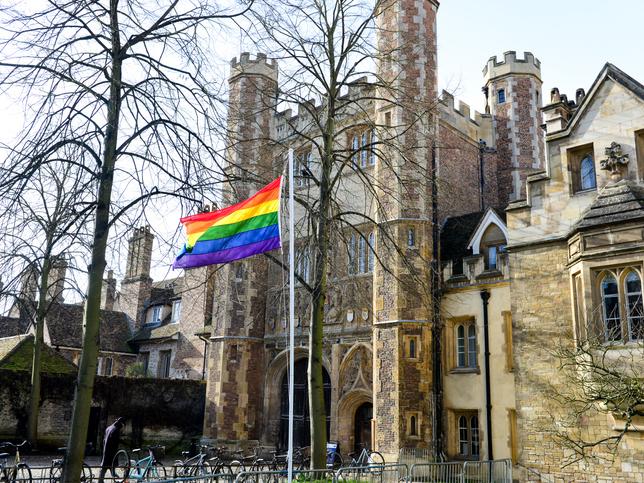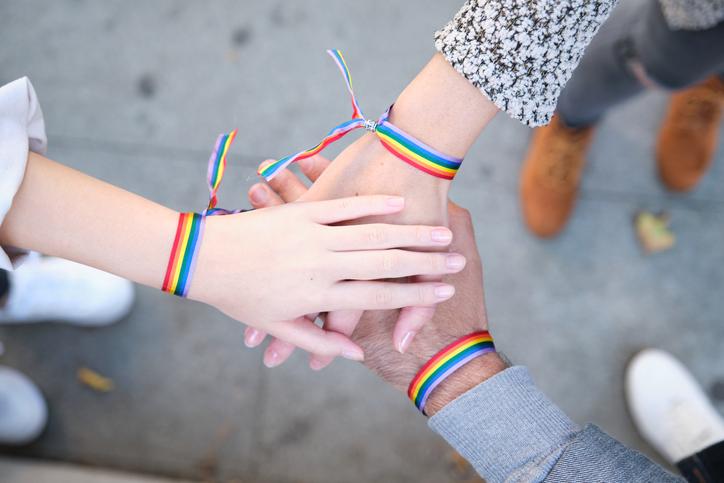
Empower LBGTQ+ people to be their authentic selves on campus with Rainbow Office Hours

Although the sector has made progress, many LGBTQ+ students and staff still feel the need to compartmentalise who they are while at work or study. Shaped by longstanding heteronormative and cisnormative expectations, the higher education environment can signal, subtly or not, that professionalism requires a degree of self-editing.
The importance of being able to be out in higher education does not stem from the desire to discuss gender and sexuality at length in the workplace. Rather, it’s about the small, everyday frustrations and challenges queer people face. For example, water-cooler conversations with your colleagues about what you did on the weekend require a rapid-fire risk assessment of the consequences of using your partner’s gendered pronouns. For students, especially those newly navigating their identity, it can mean wondering if there is anyone “like them” in the spaces where they learn or if their lecturer will use their preferred name.
- Work ‘with’ not ‘on’: making social research more inclusive for LGBTQ+ people
- Making LGBTQ+ individuals feel safe, valued and empowered on campus
- How can we make LGBTQ+ students feel welcome through our teaching?
Rainbow Office Hours were born from this desire to challenge the idea that our queerness is antithetical to our professionalism. The idea is simple: at specific times, LGBTQ+ staff hold open office hours, distinct from regular time slots, where students can drop in to talk about anything LGBTQ-related. This might range from navigating university procedures around name and gender changes to seeking advice on coming out or simply wanting to meet another queer person on campus.
Since its launch in 2019 within the School of Psychology and Neuroscience, Rainbow Office Hours has grown into a university-wide initiative, with participating staff across all colleges and professional services.
Why visibility matters
We know that visible role models and a positive campus climate are associated with better outcomes for LGBTQ+ students, while invisibility contributes to isolation and poorer mental health, according to research. Within the wider mental health crisis facing UK universities, informal, low-barrier spaces such as Rainbow Office Hours matter more than ever. As one student told us: “Simply seeing queer faculty exist openly and visibly in the workplace makes that kind of future feel more possible.” For international students, Rainbow Office Hours can also provide a first opportunity to safely connect with a queer community that may not have been legally or culturally accessible in their home countries.
For staff, Rainbow Office Hours provide a rare opportunity to express identity at work and connect with colleagues across disciplines. Participating can be both empowering and affirming, allowing queer staff to bring their whole selves to work rather than performing a version of professionalism that quietly excludes parts of who they are. As our preprint on staff and student experiences notes, this visibility enhances belonging and challenges the implicit boundaries between personal and professional identity.
How to start Rainbow Office Hours at your institution
Rainbow Office Hours are intentionally low-cost and scalable, and we’re incredibly proud to see them being adopted beyond our own institution. Rainbow Office Hours: A Practical Guide for Staff is available via the National Teaching Repository, outlining setup steps, example communications and FAQs. Here are some practical lessons for getting started.
1. Start small, think big
Even one or two staff members offering Rainbow Office Hours can have an impact far beyond their individual reach. Visibility itself is transformative: those who see the list of visibly queer staff are reminded that identity and excellence are not mutually exclusive. Advertise through existing channels such as LGBTQ+ student societies, departmental newsletters and institutional communications.
2. Clarify purpose and boundaries
Rainbow Office Hours are supportive, community-building conversations, not therapy or professional counselling. Be clear about this in all communications and signpost to formal well-being services where needed.
3. Prioritise safety and privacy
Offer drop-in formats with optional anonymity. Students should not need to register or have attendance logged. For shared offices, book private spaces or use virtual waiting rooms online.
4. Protect staff well-being
Being visibly queer in the workplace can still carry risk. Institutions should recognise this emotional labour and provide pastoral support, while allies can assist with promotion and logistics even if they do not host sessions themselves.
5. Integrate with the academic calendar
Linking sessions to awareness events keeps visibility high and fosters collaboration with student unions, EDI committees and allied networks.
For colleagues considering similar initiatives, the overarching message is that representation creates community, community fosters belonging and belonging enhances learning and retention. LGBTQ+ academics do not need to lead large-scale programmes to make a difference – small acts of visibility, such as mentioning a partner or displaying a pride flag, can signal inclusion.
Allies play an equally vital role by amplifying rather than appropriating: promoting the work of queer colleagues, advocating for recognition of EDI contributions in workload and promotion processes, and sharing responsibility for inclusive culture.
Finally, senior leaders must recognise that authentic inclusion cannot depend on the unpaid labour of marginalised staff. Rainbow Office Hours succeeded because it was grassroots, but it continues to thrive because leadership chose to support and sustain it.
As universities navigate an increasingly polarised social climate, initiatives that are grounded in care such as Rainbow Office Hours offer a blueprint for what genuine inclusion looks like: a campus where everyone can be their authentic self, and where belonging is not conditional but assumed.
Rafael Henry-Venson is senior lecturer and Emily Nordmann is associate dean of learning and teaching, both at the University of Glasgow.
The university was shortlisted in the Outstanding Contribution to Equality, Diversity and Inclusion category in the Times Higher Education Awards 2025. The full list of nominees can be found here.
If you would like advice and insight from academics and university staff delivered direct to your inbox each week, sign up for the Campus newsletter.
Additional Links
For more advice from the shortlists of the Times Higher Education Awards 2025, see our spotlight guide.


